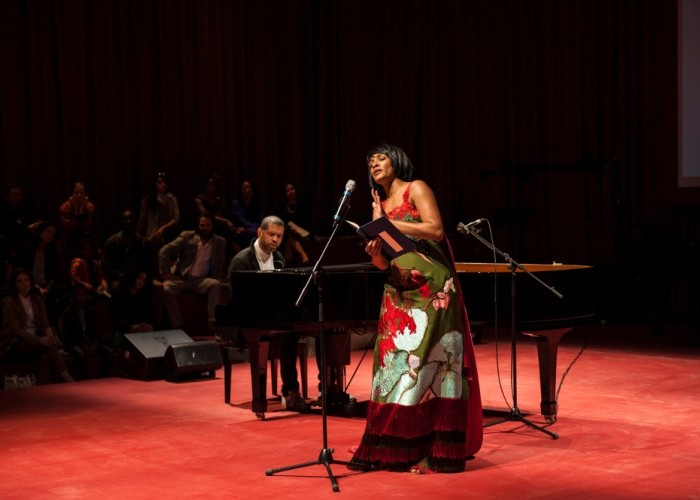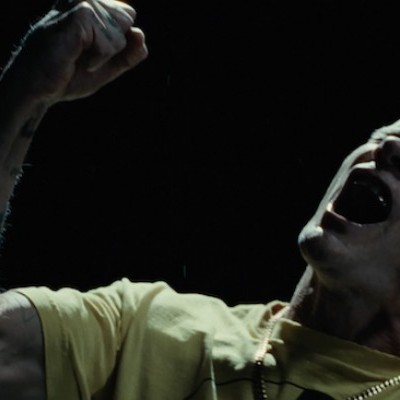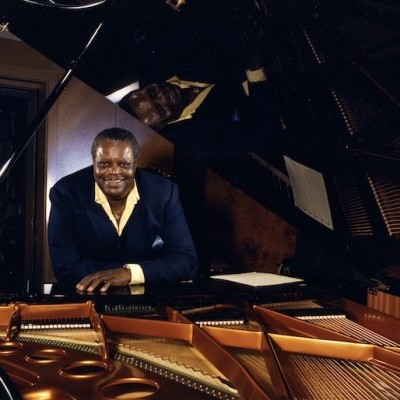Dec 9, 2025 12:28 PM
In Memoriam: Gordon Goodwin, 1954–2025
Gordon Goodwin, an award-winning saxophonist, pianist, bandleader, composer and arranger, died Dec. 8 in Los Angeles.…

Jason Moran and Alicia Hall Moran perform at the 2015 Venice Biennale in Italy.
(Photo: Venice Biennial)Most musicians are trying to get to the next buck—we do our work to pay the bills. There’s a very functional part to being out here playing music. I made certain choices early in my career that meant I had to figure out another way to roll. Like turning down Cassandra Wilson’s gig when I was fresh out of college.
What alarms did that set off?
JM: I don’t even know. I don’t even know if I discussed that with you, Alicia.
Alicia Hall Moran: Of course you did, and I was fine with it.
JM: I was learning a lot by being in Cassandra’s band because she was teaching me about repertoire and also saying things like, “I don’t know what you’re playing, man.” Her questioning that and really putting me on the spot onstage.
It was shocking and difficult, but I was making my way through it. But I also knew I was putting out my first record on Blue Note and that there was a part of me that was trying to define myself and commit to my first step. I had enough support to know it wouldn’t go terribly wrong, and I left the relationship with Cassandra in good standing. Cassandra and Meshell Ndegeocello are two women about whom Alicia said to me early on, “These are the women who are doing the hard work with their groups to produce a sound that’s never existed.”
AHM: They create a whole space with their voices and can present everything you hear on the album live. You fall in love with them—that’s how much they’re putting out. But by turning down Cassandra, Jason was also saying, “I’m going to get out of your voice because I have a voice I want to explore.” That’s how I felt. Because who wouldn’t keep a good gig that was bringing you to Japan and salt baths and lots of fun with an amazing band full of really good players? But these people have a voice, and once you play with them, you are in it, and you could stay there.
When did the extra-musical aspects, the performative and theatrical aspects, become attractive to you?
AHM: I would go to hear Jason’s band play and I’d say, “Y’all are hot!” But they came out [wearing] these casual, saggy outfits, putting music out with these not-attractive outfits like they were going on interviews for jobs they didn’t want.
I’ll never forget, I said, “You know they put a light on you when you’re on stage, right? And you know we’re sitting here, right? And you’re forcing us to look at this but you’re acting like we can’t see you. This is ugly and you’re some handsome guys, so let’s turn up the hotness! Because your show starts the second you come out on stage. And nowhere else would this pass.” And that is when Jason started thinking about his intros, and using the electronic sounds from video games and asking, “When and where do I use them?” ... So you got the intros to get them on and to get them off. And you get to where you’re not embarrassed to say, “We’re about to get into something here—watch this!” And I’ll take credit for helping to lift them out of that other accidental thing. Because I was in a yearning position—like, he’s hot and I want to love this. Desire makes you sensitive to things like that because it’s not an intellectual process.
JM: Rarely does a band have eyes in the audience looking at them and not just listening … scrutinizing what you look like and how that reads to an audience.

Goodwin was one of the most acclaimed, successful and influential jazz musicians of his generation.
Dec 9, 2025 12:28 PM
Gordon Goodwin, an award-winning saxophonist, pianist, bandleader, composer and arranger, died Dec. 8 in Los Angeles.…

Flea has returned to his first instrument — the trumpet — and assembled a dream band of jazz musicians to record a new album.
Dec 2, 2025 2:01 AM
After a nearly five-decade career as one of his generation’s defining rock bassists, Flea has returned to his first…

Belá Fleck during an interview with Fredrika Whitfield on CNN.
Jan 13, 2026 2:09 PM
The fallout from the renaming of the John F. Kennedy Center for the Performing Arts to include President Donald…

“It’s a pleasure and an honor to interpret the music of Oscar Peterson in his native city,” said Jim Doxas in regard to celebrating the Canadian legend. “He traveled the world, but never forgot Montreal.”
Nov 18, 2025 12:16 PM
In the pantheon of jazz luminaries, few shine as brightly, or swing as hard, as Oscar Peterson. A century ago, a…

Dec 11, 2025 11:00 AM
DownBeat presents a complete list of the 4-, 4½- and 5-star albums from 2025 in one convenient package. It’s a great…